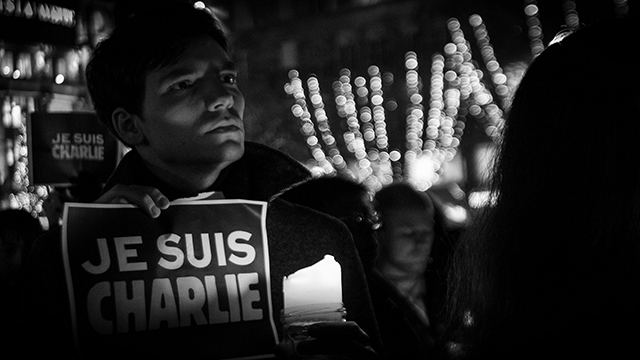In response to the attacks, the remaining staff of Charlie Hebdo published a new issue Wednesday; the cover featured an image of Mohammed holding a sign that read “Je Suis Charlie” under the message “Tout est pardonné,” meaning “All is forgiven.”
Some news outlets covering the story have voiced their support for Charlie Hebdo’s freedom of expression while electing not to publish the cartoons. The New York Times editor Dean Baquet has said that some of the cartoons amounted to “gratuitous insult,” which overrode their news value.
NPR stated that some of the cartoons violate their standards of offensive material, and publishing only the images that do not could send a false message that “Charlie Hebdo is only a bit edgier than other satirical publications.” This would skew readers’ perception of the story, NPR wrote.
Debates over free expression have taken place in France as well, with many questioning the limits of freedom of speech. French law does not protect defamation or hate speech, nor does it protect speech that is anti-Semitic, racist or homophobic. Since the attacks, French officials have arrested 54 people for hate speech, including a French comedian who prosecutors say voiced support for one of the attackers in a Facebook post.
Resource
VIDEO: Death of cartoonists in Paris draws out passionate defense of free expression (PBS NewsHour)
Pens — weapon of choice of the murdered cartoonists of Charlie Hebdo — were raised in their honor at vigils around the world. Jeffrey Brown talks to two editorial cartoonists, Tom Toles of the Washington Post and Ted Rall of the Los Angeles Times, about the role of satirical cartoonists in society and their declining number in the U.S.
To respond to the Do Now, you can comment below or tweet your response. Be sure to begin your tweet with @KQEDedspace and end it with #DoNowHebdo
For more info on how to use Twitter, click here.
We encourage students to reply to other people’s tweets to foster more of a conversation. Also, if students tweet their personal opinions, ask them to support their ideas with links to interesting/credible articles online (adding a nice research component) or retweet other people’s ideas that they agree/disagree/find amusing. We also value student-produced media linked to their tweets. You can visit our video tutorials that showcase how to use several web-based production tools. Of course, do as you can… and any contribution is most welcomed.
More Resources
ARTICLE: A Close Call on Publication of Charlie Hebdo Cartoons (New York Times)
Was The Times cowardly and lacking in journalistic solidarity when it decided not to publish the images from the French satirical newspaper Charlie Hebdo that precipitated the execution of French journalists?
AUDIO: Why You’re Not Seeing Those ‘Charlie Hebdo’ Cartoons (NPR)
Wednesday’s attack at the Paris office of the satirical weekly Charlie Hebdo is thought to have been the work of killers who believe cartoons can be so offensive that they justified the murder of 12 people. But just because offensive images are part of a story does not mean a news organization must publish or post them with its news reports. Listen to this story to learn more.
ARTICLE: Paris attacks: Dieudonne held as France tackles hate speech (BBC)
Controversial French comedian Dieudonne M’bala M’bala has been detained by police for a Facebook comment appearing to back Paris gunman Amedy Coulibaly.
